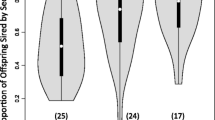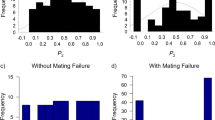Abstract
When females mate with more than one male, the ensuing sperm competition leads to the evolution of male mechanisms that skew paternity. Males of the yellow mealworm beetle (Tenebrio molitor) transfer a spermatophore to females during copulation, but sperm release and storage occur later. We investigated how the interval between two matings with different males affects sperm precedence by varying the interval between the copulations so that the second mating was either: (1) before sperm release from the first spermatophore (<5 min); (2) after sperm release but before spermatophore ejection (15–20 min); (3) after spermatophore ejection but before sperm storage (4 h), or (4) after complete sperm storage (24 h). We collected offspring over a period of 2 weeks and determined paternity by protein electrophoresis. There was second-male sperm precedence in all treatments, but when the interval was <5 min, the second male usually (86% of cases) had complete sperm precedence (i.e., P 2=1). Investigations into the mechanism of second-male sperm precedence during <5-min mating intervals indicate that sperm release from the first spermatophore is inhibited, a phenomenon which has not been previously documented.
Similar content being viewed by others
Author information
Authors and Affiliations
Additional information
Received: 31 January 2000 / Revised: 9 June 2000 / Accepted: 26 August 2000
An erratum to this article is available at http://dx.doi.org/10.1007/s002650100320.
Rights and permissions
About this article
Cite this article
Drnevich, J., Hayes, E. & Rutowski, R. Sperm precedence, mating interval, and a novel mechanism of paternity bias in a beetle (Tenebrio molitor L.). Behav Ecol Sociobiol 48, 447–451 (2000). https://doi.org/10.1007/s002650000257
Issue Date:
DOI: https://doi.org/10.1007/s002650000257




